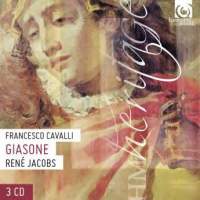Texte paru dans: / Appeared in: |
|
|
Outil de traduction (Très approximatif) |
|
|
Reviewer: Tess Knighton
To mount a production of a Cavalli opera is still no mean feat, even though since the pioneering work of Raymond Leppard it has become much more commonplace to plunder the riches of the musical past. Leppard's versions of Cavalli's music dramas were tailored to accommodate at least some of the operatic expectations of audiences brought up on Mozart, Verdi and Wagner. The quest for 'authentic' Cavalli is hardly begun , and, as Rene Jacobs, director of the Innsbruck production of Giasone subsequently recorded here by Harmonia Mundi, clearly discovered, there are plenty of obstacles to overcome first, not least the preparation of an Urtext. He prepared his edition from three of the 12 extant musical sources, collating the many discrepancies and relying on them to indicate which passages might be cut.
Seventeenth-century Venetian opera audiences certainly demanded value for money; four or five hours of musical entertainment was the norm, and although this three-CD set approaches the lower limit, several passages and even one inconsequential character have still been axed . While it is a shame that the exchange between Oreste and Isifile (Act 3, scene 8) is so severely pruned (for it does have a bearing on the action), Jacobs's decision to alter the order of the scenes at the end of Act 2 is harder to justify. The light-hearted exchange between two minor characters, Besso and Alinda, makes a satisfactory 'finale' musically , but altering the order does weaken the drama.
Jacobs has also made a number of additions, particularly as regards the instrumental ritornellos (many of which are missing from the original sources). Of these , only Schmelzer's Fecht-Schule sounds stylistically out of place, while Jacobs's own reconstruction of Medea 's vengeance aria settles more or less into place . Indeed, his startingpoint for the realization of the score -"it is simply not enough to play only the notes written in the manuscript"- is not, on the face of it, so different from Leppard's. This affects two major decisions: the addition of two viola parts to maintain a fivepart texture throughout the instrumental passages; and the accretion of instruments other than strings, most noticeably and persistently in this case, recorders. The question remains as to whether this is justifiable as a compromise with seventeenth-century procedure or whether it is pandering too much to twentieth-century expectations of orchestration and variety of timbre. Either way, it is all done stylishly enough, and only the most hardened purist would object to this recording on these grounds alone.
The only objection that might be raised as regards the singing relates to another perennial problem in Cavalli: the vocal projection of the drama through what may seem to be a relatively restricted musical language of recitative and arioso passages. This is especially crucial on a recording where movements and facial expressions have to be conveyed through the voice alone if the emotional impact is to be felt. Cicognini's libretto for Giasone is only tangentially related to the story of Jason and the Argonauts, and his rewrites will undoubtedly annoy classicists today, just as this , together with the unorthodox juxtaposition of the comic and the serious, allowed the critics of his own time to mount their high horses.
Whatever the transgressions of the storyline, the blend of tragedy and comedy is dramatically effective, and is successfully reflected in the music: for example, Isifile's long laments (affectingly sung by Catherine Dubosc) full of sustained dissonances, are pitted against humorous or lighthearted passages such as the canzonetta-style duet between Oreste and Alinda, a small role brightly sung by Agnes Mellon. On the whole, all the roles are rather under-characterized; only Dominique Visse as the nurse Delfa really makes the words come alive (and in Innsbruck his acting apparently brought the house down). Some may think his interpretation over the top, but actually Cavalli can take it, and tenor Gianpaolo Fagotto as the stuttering hunchback Demo could have been much funnier with a little of the Visse high camp. Harry van der Kamp is a suitably scornful Ercole to the love-sick Giasone of Michael Chance, whose rich and flexible countertenor voice enhances Cavalli 's melodious vocal lines well . Equally lovely is the quality of Catherine Dubosc's soprano, though a little extra weight in the lower register would have added an extra dimension to her laments. Mezzo Gloria Banditelli is all too one-dimensional as Medea, a character who runs through the gamut of emotions, good and evil, and a clear forerunner to Cherubini's great portrayal. Guy de Mey as Egeo and Bernard Deletre and Michael Schopper in the smaller roles of Oreste and Besso are all on the bland side in terms of characterization, though vocally proficient.
Despite such reservations , however, it must be said that this is an ambitious project that has been well realized; credit must go to Rene Jacobs for his painstaking perseverance in working towards an ideal, and to Harmonia Mundi for having the courage to back this opportunity to make Cavalli's operatic masterpiece more accessible.
|
|
|
|
|
|
Cliquez l'un ou l'autre
bouton pour découvrir bien d'autres critiques de CD |
|



